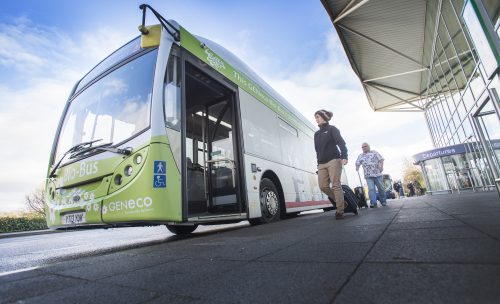
First Bristol have confirmed that their plans to run a fleet of poo buses has gone to pot as two multi-million pound funding bids are rejected by The Office For Low Emission Vehicles
Launched in March last year, on the aptly named number two route in Bristol, the UK’s first bio-bus or poo bus as it was more commonly known was led by Wessex Water’s renewable energy company GENeco. The aim was to show how biomethane gas produced from sewage and organic waste could be used as a sustainable alternative to fossil fuels.
If the trials were successful, GENeco and Wessex Bus had hoped to run fleets of poo buses and had put in a £2.5m bid to fund 20 Bristol bio vehicles by 2019, while First Group wanted to run 110 gas powered double-deckers – however The Office For Low Emission Vehicles (OLEV) have turned down the plans.
The gas produced by Bristol sewage treatment works in Avonmouth run by GENeco is now instead injected into the national gas network.
Ian Drury, spokesman for GENeco, said to the Bristol Post: “The Bio-Bus was operated in the Bristol area for more than a year and it was extremely successful with both passengers and environmental organisations praising the initiative. Most importantly it started a global debate on how biomethane buses running on renewable sources could significantly reduce air emissions in cities around the world.
“We’re delighted to see that one of the legacies of the Bio-Bus is that following successful bids to OLEV there are set to be more than 70 biomethane buses running in other parts of the country. While we’re disappointed that both First Bus and Wessex Bus were unsuccessful with their bids, the gas we produce continues to be put to good use and powers thousands of homes in the Bristol area.”
First Group has commented: “We learned a lot when trialling the ‘bio (poo) bus’ in Bristol, and were disappointed that our joint bid alongside South Gloucestershire Council, Bristol City Council, Bath & North East Somerset Council and North Somerset was unsuccessful.
“Despite the setback around this bid, we continue to actively explore ways in which we can move forward with such investment as soon as possible.”
Read CBW’s report of the launch here

